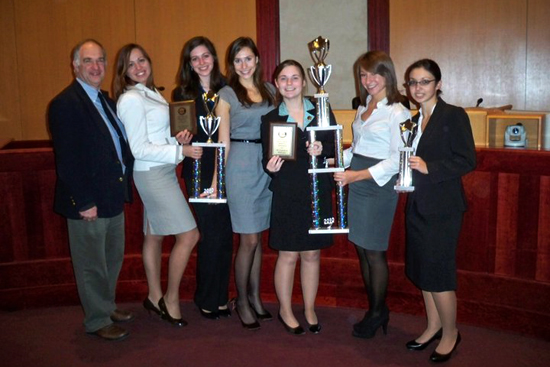Mock Mediation Team Wins Fifth National Championship
Students gearing up for global competition in March

The case before Megan Haapala was a difficult one. The victim said she had been sexually abused years before by a priest at the Catholic school she attended as a child. She was now suing because she felt the school had failed to protect its students. The school, while apologetic, thought the blame was misplaced because the abuse had happened so long ago, under a different administration.
Haapala’s job was to mediate between the two parties.
She carefully considered what both sides were asking as she helped to craft a settlement that each could agree to in order to avoid a trial. “The school agreed to build a counseling center for kids, and the victim was invited to come speak once a month to the students about living with abuse,” Haapala says. “And additional money was given to the victim for her pain and suffering and to cover the cost of therapy.”
Haapala (CAS’13) isn’t a real mediator. There was no real victim, no real abuser, and no real lawyers. Rather, Haapala, a member of BU’s Mock Mediation team, had traveled to Des Moines, Iowa, to take part in the 11th Annual Intercollegiate Mediation Tournament this past November.
Her successful mediation of the difficult case earned Haapala and teammates Valerie Kaplan (CAS’12) and Aimee Reilert (CAS’12) the top score in mediation as well as the national championship. BU was among 32 teams competing. The women’s victory means that they will head to London in March to take part in the international competition. There, they will face law school students from Germany, England, Canada, and the United States. Only two U.S. undergraduate colleges qualified for the international competition—BU and a team from Loras College, in Dubuque, Iowa.
This is the fifth national title BU’s Mock Mediation team has earned in nine years. The team also placed in the top 10 for advocacy at the Iowa competition. Additionally, Haapala’s and Picarella’s high mediation scores in the competition brought them recognition as All-American Mediators. A second team from BU—Anna Antonova (CAS’11), Isabella Nagy (CAS’11), and Mary Beth Picarella (CAS’11)—earned fifth place in mediation. London will mark the group’s first appearance at an international competition.
Although the six members of BU’s Mock Mediation team practice and prepare together, the competition requires that teams consist of three to five people, so they split up when competing.
The national mock mediation tournament is organized and sponsored by the International Academy of Dispute Resolution. Its goal is to teach students how to mediate in a legal setting.
“Many things are disputed before going to trial, and through mediation, it can be a peaceful dispute process,” says Antonova. “We simulate what goes on before a trial would take place. It usually benefits both sides to mediate, because they find a middle ground and a solution that benefits both of them. In a trial, one person wins and one person loses.”
Mediation is an effective skill for anyone adds group advisor Edward Stern (LAW’72), College of Arts & Sciences assistant dean for pre-law advising. “The skills in mediation are terrific in terms of listening to the other side, understanding the limits of compromise,” he says. “You use mediation skills with your family, employer, and in everyday life.”
To prepare for the national tournament, the team assembles weekly in the months leading up to the event. For the week before the competition, the members meet daily. Organizers give each team five different cases to prepare, although only four are used during the actual event. Team members do not learn which case they will present until 30 minutes prior to the start of each round, so preparation is critical. In each round, team members take turns acting as either the mediator, plaintiff, or defendant.
Law professors and professional mediators judge the competition, and scores are awarded based on a team members’ understanding of the problem, the consistency of their argument, and their ability to communicate with one another.
Haapala says her winning strategy was to remain open to the needs of both sides. “You’re there to find common ground. The cases are sensitive issues, and you have to look at what’s in the best interest for each side,” she says. “I try finding an agreeable solution by emphasizing that it’s important to settle in mediation, because then people don’t have to undergo a lengthy, stressful trial.”
There is room for only six undergraduates on the Mock Mediation team each year, so earning a place isn’t easy. Tryouts are in April. Interested students should contact the CAS Pre-Professional Advising Office at 617-353-4866 for more information.
Amy Laskowski can be reached at amlaskow@bu.edu.

Comments & Discussion
Boston University moderates comments to facilitate an informed, substantive, civil conversation. Abusive, profane, self-promotional, misleading, incoherent or off-topic comments will be rejected. Moderators are staffed during regular business hours (EST) and can only accept comments written in English. Statistics or facts must include a citation or a link to the citation.